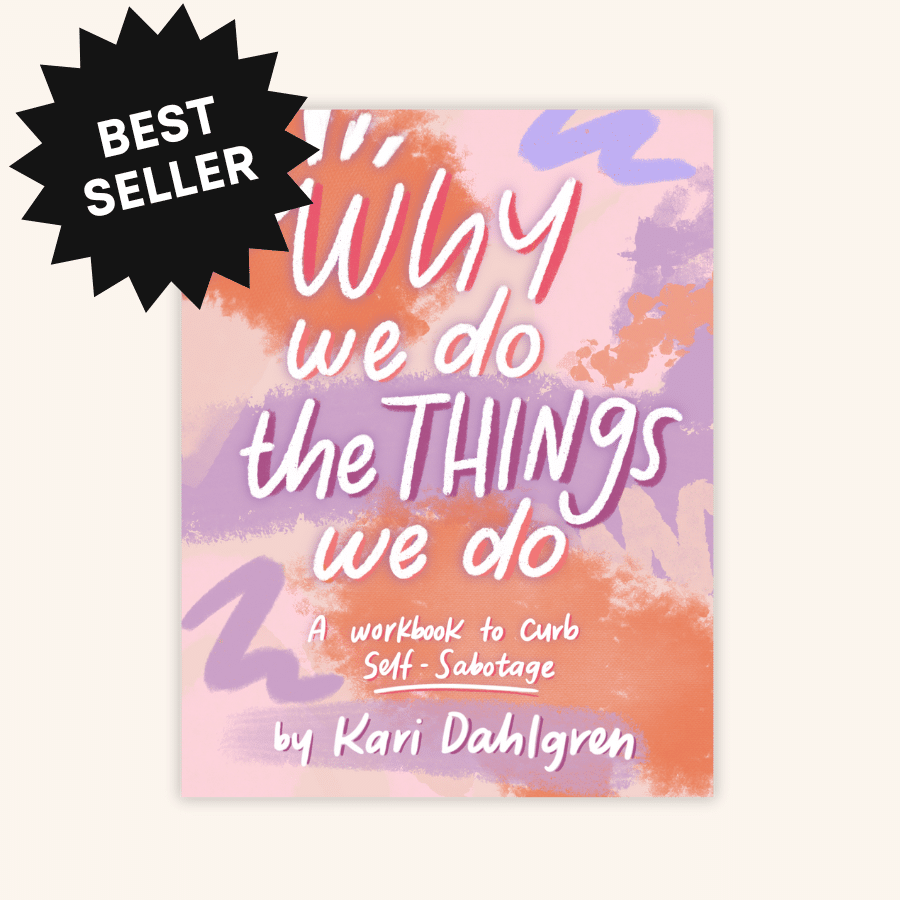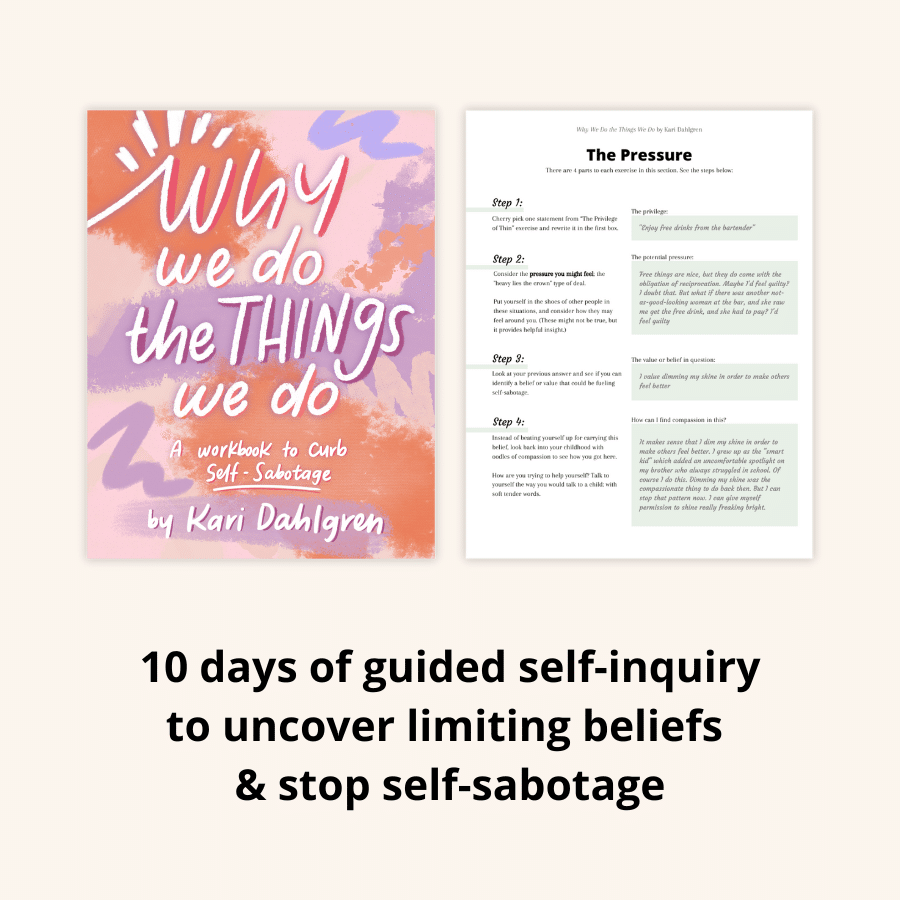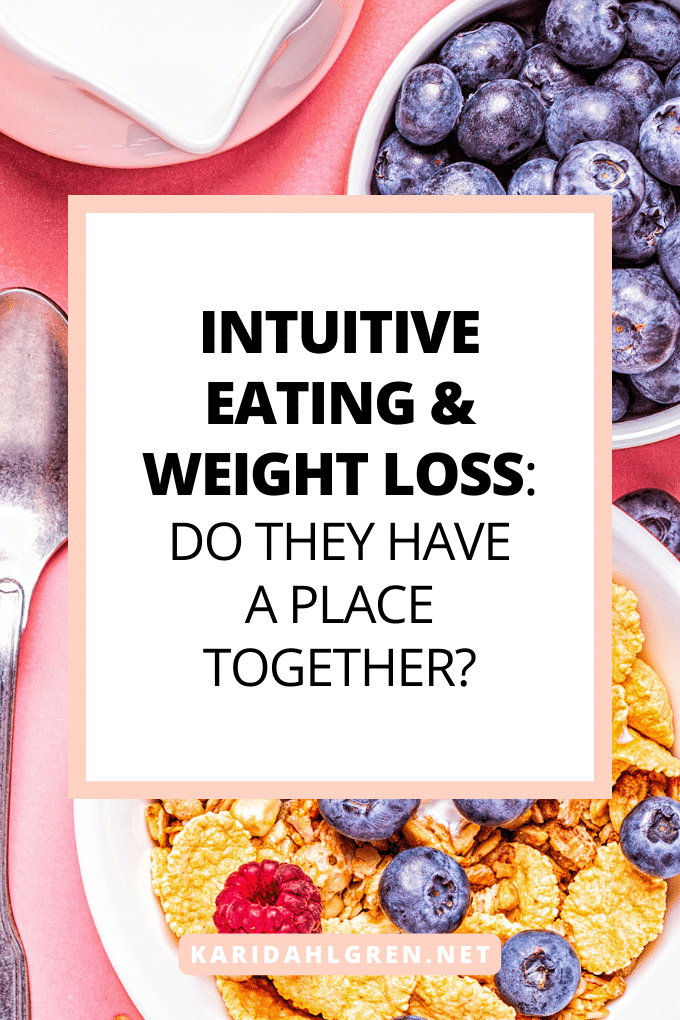
Does intuitive eating help with weight loss? Clinical studies say yes—but weight loss isn’t really the point, is it? Also, many anti-diet advocates rally against intuitive eating for weight loss. Why?
On one hand, a focus on weight loss might negate the positive effects and efficacy of intuitive eating. The very philosophy of intuitive eating is centered on a weight-inclusive or “health at every size” approach, which involves focusing on body acceptance and health over weight loss.
That said, will you “ruin” your intuitive eating efforts if you still want to lose weight? If you adopt intuitive eating in the hopes of losing weight, will it backfire? The short answer is no — and the long answer is worth sticking around for. I dug into 20 clinical studies to help answer these questions.
What Is Intuitive Eating?
Intuitive eating was formalized and popularized by Evelyn Tribole and Elyse Resch in their 1995 book, Intuitive Eating: A Revolutionary Program That Works. The roots of intuitive eating, however, extend far beyond this with contributions from various thought leaders like Geneen Roth in the 1980s and others who have long advocated for a holistic approach to eating and wellness.
Intuitive eating encourages you to make food choices based on internal wisdom rather than external rules. This style of eating is centered on tuning into your body’s hunger/fullness signals, moving away from diet culture and the restrict-binge cycle, and fostering a healthier relationship with food.
The philosophy of intuitive eating rejects traditional dieting methods that often involve calorie counting, strict portion control, or rigid eating schedules. Instead, it promotes a more natural, mindful way of eating, where the focus is on how foods make you feel, both physically and emotionally.
As an eating psychology coach who enjoys the concept of intuitive eating, I carefully position myself away from the formalized intuitive eating sphere as I have my own philosophies and opinions. While my approach, Psycho-Spiritual Wellness, has much in common with intuitive eating, I am distinctly different in how I focus on psychology and spirituality.
Still, I know my way around the language and science of intuitive eating, including the popularized version of it. If you’re wondering if intuitive eating helps with weight loss, or if you can desire weight loss while eating intuitively, you’re about to find some evidence-based answers.
The Science Behind Diet Failure
First, let’s dig into the clinical evidence in support of intuitive eating over dieting. Studies have found that restrictive dieting actually leads to long-term weight gain, not weight loss.[1] If you’re interested in intuitive eating for weight loss, it is already a step in the right direction.
Robust clinical evidence also links restrictive dieting with depression, reduced self-esteem, and an increased likelihood of binge eating.[2], [3], [4] To worsen the problem, research shows that restriction leads to heightened cravings for “comfort foods” and a slower metabolism.[5], [6], [7]
This means that when you restrict your diet, you crave higher calorie foods, increase the chances of eating past fullness, and increase the likelihood of storing that excess energy as body fat. It is a vicious cycle known as the restrict-binge cycle.
Dieting doesn’t just trigger biological rebellion from the body, but it also triggers psychological rebellion too. Numerous studies show that restricting certain foods and making them “off-limits” increases our preoccupation with them.[8] [9] [10]
It’s called the “forbidden fruit” effect where we want what we can’t have.
In an attempt to avoid foods that are “off-limits,” many dieters resort to mind games such as keeping forbidden items out of the house and “saving calories” for dessert. I like to argue that this is one of many reasons why dieting leads to anxiety, depression, and reduced self-esteem. It makes us feel crazy!
Even if you have high willpower for weight loss, the human body is not wired to lose weight long-term through restrictive dieting. Biology takes over and the restrict-binge cycle ensues. Dieting doesn’t work—plain and simple. This is where intuitive eating comes into play.
The Science Behind Intuitive Eating and Weight Loss
Instead of making foods off-limits and therefore perpetuating the restrict-binge cycle, intuitive eating encourages you to allow all foods and view all foods as equal—a concept known as food neutrality. This means no more “good” and “bad” foods or placing certain foods “off limits.”
Many people are afraid of gaining weight when eating intuitively, because they believe that food rules are the only thing keeping their eating under control. Yet, plenty of clinical evidence shows that food rules are a trigger for overeating and weight regain.
Fortunately, a growing body of research supports intuitive eating as a means for better physical and mental health. Intuitive eating has been linked to reduced depression and reduced shame and guilt after eating.[11] [12] Other studies have shown that intuitive eaters actually eat more fruits and vegetables than people who diet.[13]
In regards to weight loss specifically, one pilot study from 2012 found that calorie restriction worked better for weight loss than intuitive eating.[14] However, that study only followed participants for the length of the study (6 weeks) with no follow-up—and follow-up matters.
While calorie restriction leads to weight loss in the short-term, it is not sustainable nor does it last. Numerous studies show that restrictive dieters are likely to regain their weight within 2 years—with one third of people exceeding their initial weight.[15] [16], [17], [18] When you look at the clinical evidence, it’s no wonder dieting creates a perpetual sense of failure.
Finally, a long-term study published in 2014 found that intuitive eaters are more likely to maintain a stable weight and improve metabolic fitness even after 2 years, while dieters tend to regain the weight.[19]
Later, an even longer-term study published in 2021 found that intuitive eaters maintained healthier weights and exhibited fewer unhealthy eating behaviors over a 5-year period compared to those not practicing intuitive eating.[20]
The science is clear: dieting leads to diminished physical and mental health and intuitive eating improves both over the long-term.
Can You Desire Weight Loss While Eating Intuitively?
Many people are drawn to intuitive eating because they’ve experienced the restrict-binge cycle too many times and feel a glimmer of hope that something radically different, like intuitive eating, can work. Many of these people also want to lose weight.
However, in the anti-dieting sphere, some spokespeople vehemently advocate against having any desire for weight loss in order for intuitive eating to work. As someone that has personally climbed out of the restrict-binge cycle and made peace with food, I could not disagree more.
Here’s a YouTube video where I discuss why it’s okay to desire weight loss while eating intuitively and what to do when the desire gets too extreme:

The key is to practice acceptance of the desire to lose weight—if you’re above your ‘set point’ or natural weight—while paying close attention to the moment it becomes urgent, obsessive, or the priority.
In many of the studies referenced above, the intuitive eaters were following a program that emphasized body acceptance and health over weight loss—a central tenet of intuitive eating. Does this mean that you’ll “ruin” your relationship with food by desiring weight loss while trying to eat intuitively? No!
However, this does mean that allowing weight loss to become preoccupying can lead you off track. If it becomes too distracting, it can perpetuate unhealthy eating behaviors and potentially negate the efficacy of intuitive eating.
That why, in my video above, I talk about using the desire to lose weight as a barometer. Whenever the desire to lose weight becomes urgent, it means there’s something else going on. Try using self-inquiry tools like my Stop, Drop, & Feel technique to identify what’s really going on.
Signs That You’re Prioritizing Weight Loss Over Intuitive Eating
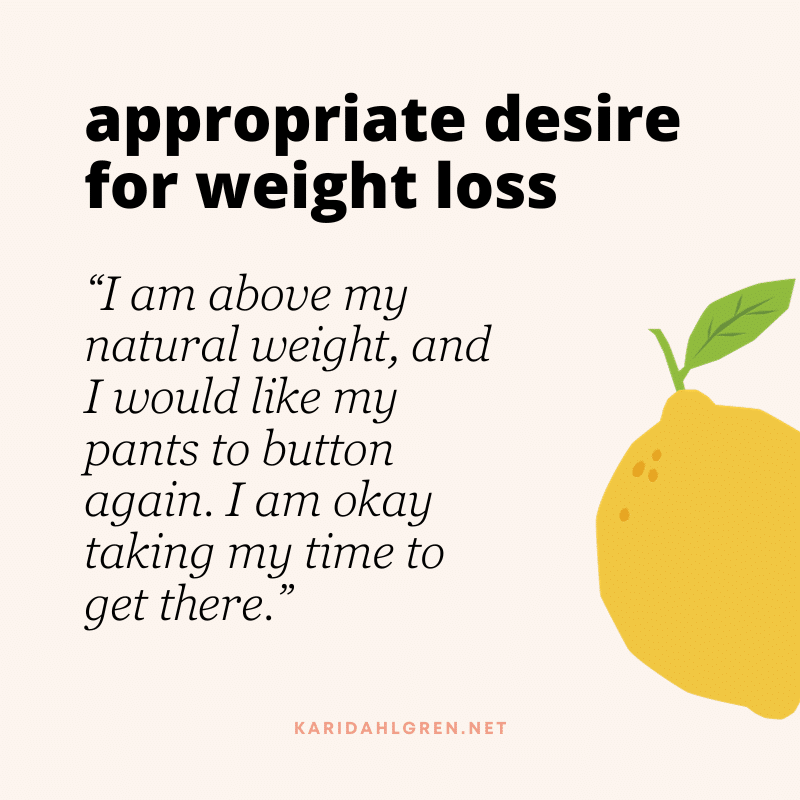
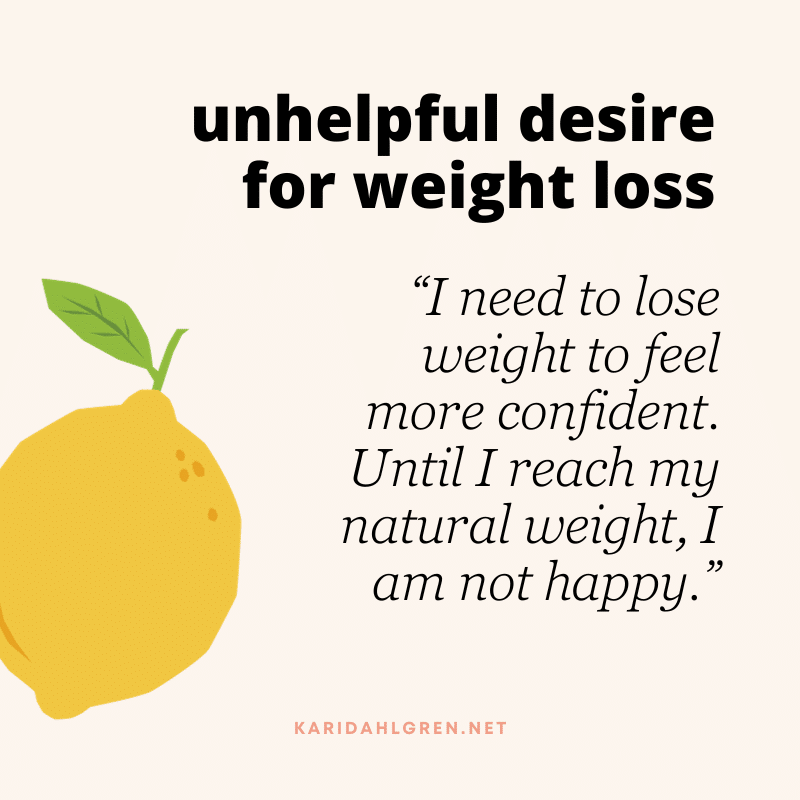
Now let’s add more clarity around what all of this looks like. What does it mean to have a “normal” desire for weight loss while eating intuitively? Use the following lists to identify an appropriate desire for intuitive eating weight loss—and what to look for when thoughts become unhelpful.
An unhealthy relationship with weight loss might look like:
- Prioritizing weight loss as the primary objective, with wellness as a secondary concern
- Defining the ideal weight as a specific “goal weight” or arbitrary number determined by your brain, not your body
- Demonstrating intolerance for normal fluctuations in weight
- Experiencing panic with any sort of increase in weight
- Exhibiting hypervigilance with using the scale
- Feeling anxiety before weighing yourself or experiencing a negative mood if the number goes up
- Focusing on external measures such as the number on the scale or number of calories consumed
A clear sign that your mindset is not conducive to intuitive eating is viewing weight loss as the primary goal and everything else secondary. Intolerance or panic during normal weight fluctuations are a clear sign that you need to focus on body acceptance.
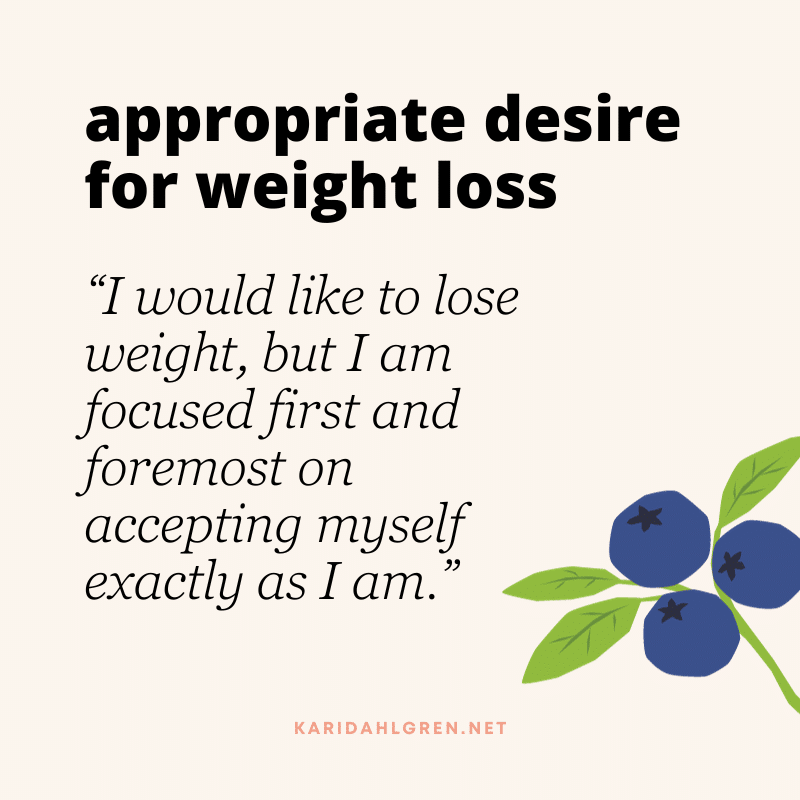
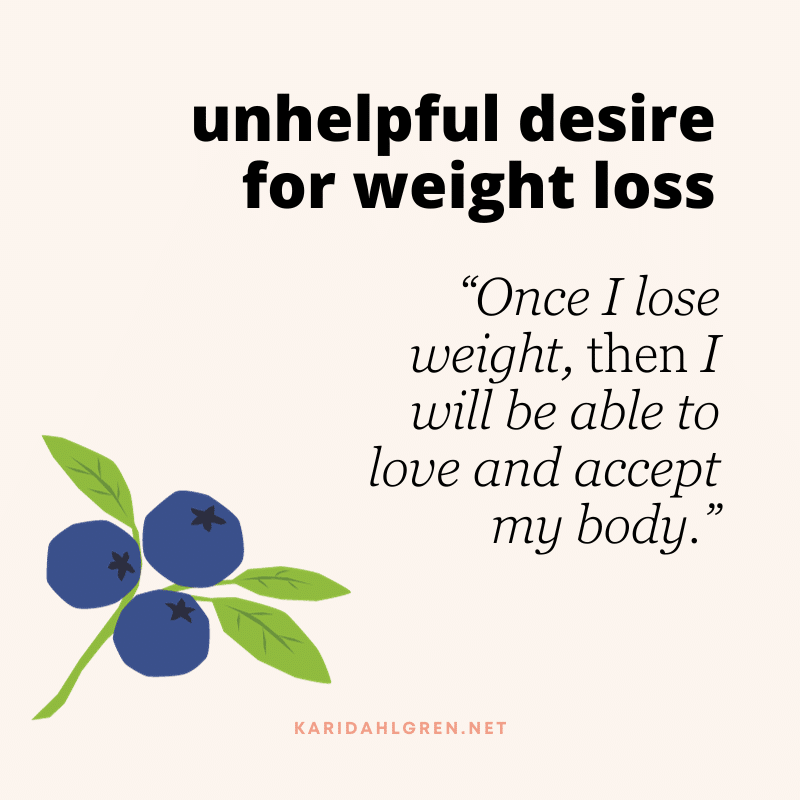
A healthy relationship with weight loss and intuitive eating might look like:
- Prioritizing overall health as the primary goal, with weight loss as a potential secondary outcome (“if it happens, it happens!”)
- Embracing your body as it is now, not after you lose weight
- Remaining calm and untroubled through normal weight fluctuations
- Throwing the scale away and focusing on how you feel, or…
- Keeping the scale and feeling unattached and unemotional whether the number goes up or down
A better mindset for intuitive eating and weight loss is viewing weight loss as a natural byproduct of healing your relationship with food—not the primary goal.
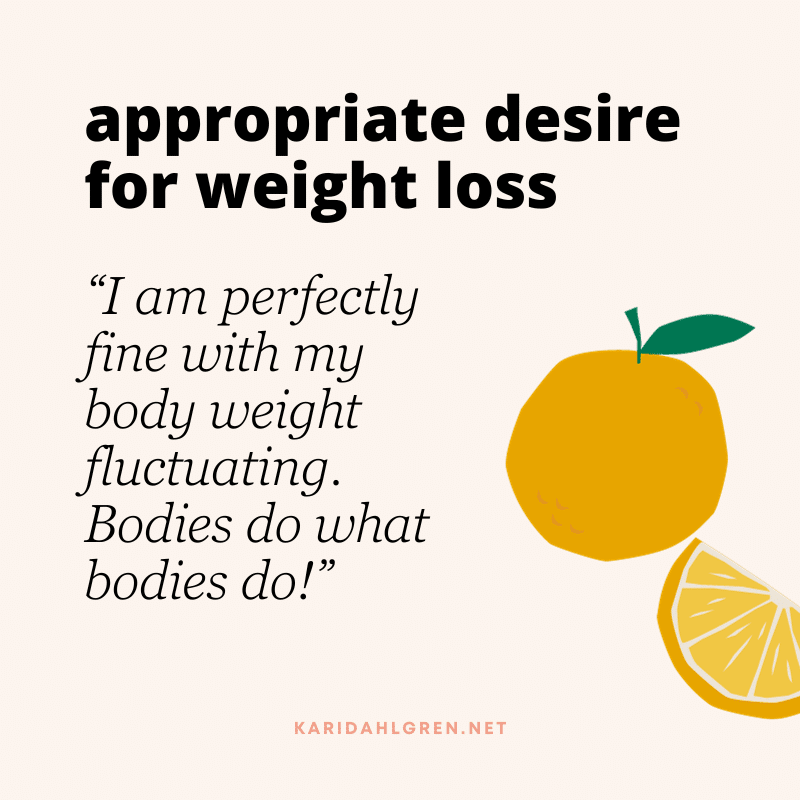
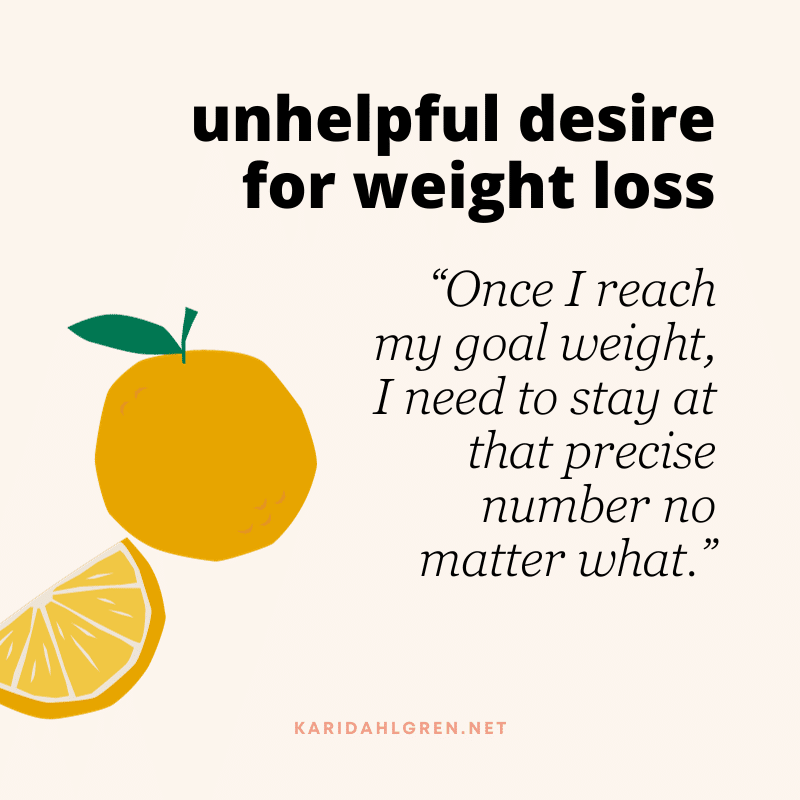
How to Flip the “Intuitive Eating Weight Loss” Paradigm
Personally, whenever I feel the urgent desire to lose weight, it’s a response to an uncomfortable situation somewhere in my life. Until that situation gets the attention it needs, the desire for weight loss will remain heightened.
For example, in my book I talk about how joining a public speaking club made me want to lose weight—even though I had already made substantial peace with food and curbed my overeating. What was really happening is that public speaking made me nervous, and my brain instantly leapt to the conclusion that being thinner would give me more confidence.
(Spoiler alert: being thin does not solve our problems.)
Instead of becoming preoccupied with weight loss, I recognized the urgent desire to lose weight as a sign to turn inward. Instead of hopping on a diet, I focused my energy on managing my anxiety through other coping mechanisms—mainly the Stop, Drop, & Feel.
With this personal experience under my belt, along with six years of coaching others through compulsive eating, I strongly believe that the desire to lose weight does not ruin intuitive eating efforts. In fact, it can turn into a useful barometer that lets you know when to turn inward.
This example illustrates the power of eating psychology and how your relationship with food can be used as a doorway into a journey of spiritual growth. Hopefully you can see why I’ve dubbed my personal philosophy Psycho-Spiritual Wellness.
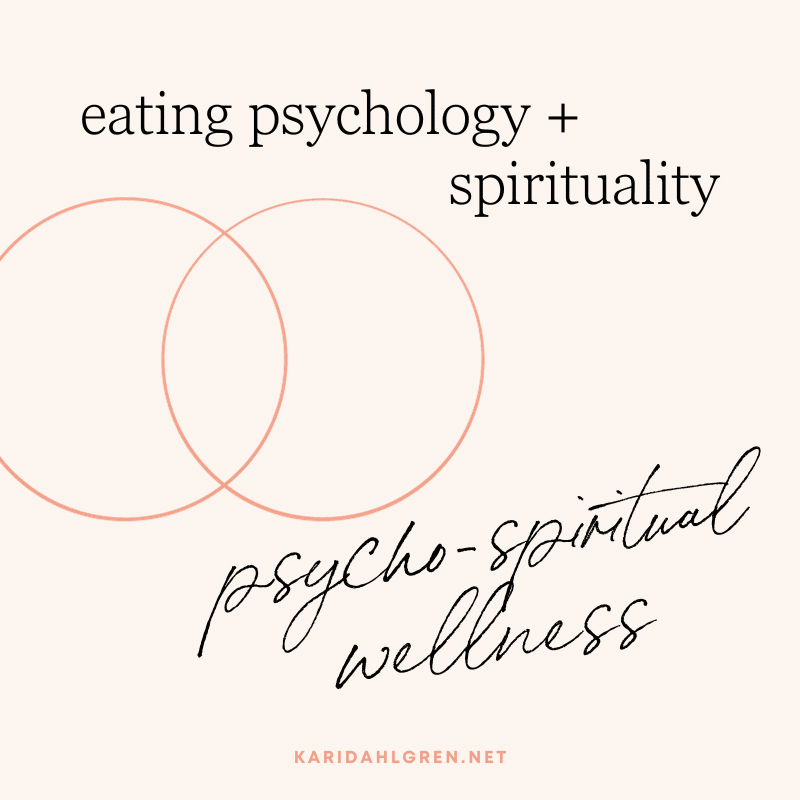
Ultimately, Will Intuitive Eating Help You Lose Weight?
To answer this question simply, yes intuitive eating can help you lose weight if you’re above your natural weight. In fact, intuitive eating leads to a more stable weight than dieting and it also improves mental and physical health, too.
This can create a virtuous cycle (much unlike the restrict-binge cycle!) where better self-esteem leads to more energy, which fuels the empowering shift away from diet culture and towards a more natural, intuitive relationship with food.


